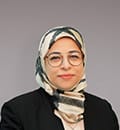Program Structure
The Doctor of Medicine (MD) program is a six-year curriculum organized into three progressive phases. The structure reflects the College of Medicine’s philosophy of integrating biomedical sciences, clinical sciences, population health, and professional practice, preparing graduates for safe, evidence-based, and compassionate medical care.
Phase I: Pre-Medical
This phase serves as the bridge between secondary education and medical studies. Students are introduced to the foundations of biomedical sciences, public health, research methodology, and communication skills essential for interprofessional practice. Courses such as Human Biology, Biochemistry, Molecular Biology, Nutrition and Metabolism, Principles of Psychology, and Communication Skills are complemented by general education requirements in English, Emirati Studies, Islamic Culture, and Entrepreneurship and Innovation. Students also experience early clinical exposure, providing initial insights into the role of doctors within the health system.
Phase II: Pre-Clerkship
In this phase, the curriculum adopts a clinical presentation-based approach, integrating organ-system modules (e.g., Cardiovascular, Respiratory, Gastrointestinal, Endocrine, Nervous System). Longitudinal threads in Professionalism and Ethics, Epidemiology, Research and Knowledge Translation, and Emerging Technologies in Medicine (including AI and Health Information Systems) are woven across modules. Practical skill development is emphasized through Clinical Skills and Medical Diagnostics. Students also engage in a Readiness for Clinical Practice course, consolidating competencies before they enter the Clerkship Phase. By the end of this phase, students complete the International Foundations of Medicine (IFOM) Basic Science Examination, benchmarking their knowledge against international standards.
Phase III: Clerkship
The final two years immerse students in clinical clerkships across partnered teaching hospitals and community healthcare settings. Training spans Internal Medicine, Surgery, Pediatrics, Obstetrics and Gynecology, Family Medicine, Psychiatry, Emergency Medicine, and Subspecialties. Professional development, patient-centered care, and population health are continuously reinforced, with explicit attention to the social determinants of health and emerging healthcare needs in the UAE.
MD Program Domains
The program contains a mix of courses from general, introductory, and advanced courses to conform with the requirements of international norms and the national guidelines of UAE. The 49 courses are categorized into three Domains. The Domains and the codes of the courses in those domains are listed below:
Domains | Courses | Credits | |
Core Courses (126 CH) | Basic Biomedical Sciences | 8 courses | 32 (CH) |
Preclinical Sciences | 12 courses | 61 (CH) | |
Public Health, Professionalism, and Medical Ethics | 7 courses | 17 (CH) | |
Evidence-based Practice and Research | 4 courses | 9 (CH) | |
Emerging Technologies in Medicine | 3 courses | 7 (CH) | |
Electives (5 CH) | 2 courses | 5 (CH) | |
Practical Experience & Projects (93 CH) | 13 courses | 93 (CH) | |
Total | 224 (CH) | ||
MD Program: Figure Representation Of Course Domains

Educational Philosophy and Delivery
The MD program emphasizes:
- Integration of sciences and practice: Biomedical, clinical, and behavioral sciences are taught in an integrated manner around clinical presentations (aligned with Emirates MEDs).
- Hands-on and simulation-based training: Pre-clinical years include advanced simulation sessions to develop procedural and diagnostic skills.
- Diverse clinical settings: Students train in primary care, inpatient, outpatient, emergency, and community health facilities.
- Inculcation of research: Students progressively develop research competencies through core courses, research-focused modules, and elective opportunities, fostering a culture of inquiry and evidence-based practice
- International benchmarking: Assessment standards are aligned with the best global practices, including IFOM Basic and Clinical Sciences Examinations by the NBME (USA).
Phase Coordinators

Prof. Naglaa Raafat

Dr. Sadaf Majeed


